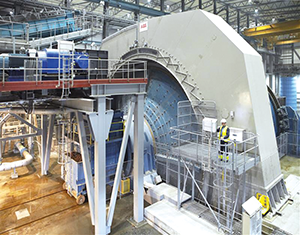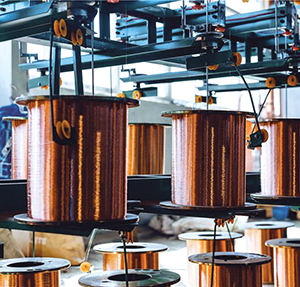

Achieving energy efficiency savings is highly important to the future of the mining industry. Humanity’s demand for critical minerals is growing thanks to the twin drivers of increasing digitalisation and the energy transition. Meanwhile, ore quality is declining, requiring more ore to be mined to produce the same amount of metal. This challenge is further compounded by growing pressure to reduce the environmental impact of mining. Addressing all these challenges simultaneously is a challenge of enormous proportions.
ABB has released an in-depth white paper detailing the vital role that gearless grinding technologies can play in driving productivity in mining, while simultaneously reducing their carbon footprint. One of the key findings in the report, based upon extensive testing of ABB’s current installed base of gearless mill drives (GMDs), is the high level of efficiency they provide. GMDs can be up to 3,6% more energy efficient than ring-geared mill drives (RMDs), reducing energy consumption and operational costs of the mine. This level of efficiency across ABB’s GMD installed base equates to 195 kt of CO2, the equivalent of 89 000 cars taken off the road. Even a conservative 2% of increased efficiency equates to 106 kt of CO2 saved, or 49 000 cars taken off the road.
Grinding operations at mines around the world are undergoing a transformation. Multiple marketplace pressures are driving mining owners to deploy technology solutions that minimise energy use and maximise productivity while achieving sustainability objectives. Going gearless can meet mining business objectives by exceeding standard availability targets in grinding operations. ABB’s GMD is the most powerful mill drive system in the market to power semi-autogenous (SAG), ball, and autogenous (AG) mills. This workhorse for grinding operations combines a robust, service-friendly, and fit-for-purpose design to provide the highest throughput, reliability and availability for processing plants.

ABB’s latest white paper investigates how such issues are impacting the copper industry. Copper is vital for the energy transition and demand is predicted to double by 2050. Yet today, roughly only 0,5% of ore can be converted to copper, down from historical levels of 1%. To maintain the same levels of copper production, modern mines must process double the quantity of ore. However, increasing mining outputs without supporting sustainability initiatives could contribute more emissions than copper can negate.
The only way to produce more critical minerals such as copper, while also minimising the environmental impact of mining operations is through the use of GMDs. GMDs have proven their value across industries for more than 50 years and have demonstrated the potential to deliver a more environmentally friendly, efficient, and reliable grinding operation than would be possible with alternative technologies.
GMDs are the system of choice for mines looking to a more efficient and productive future. As GMDs have fewer mechanical parts, they have been found to be more energy efficient, more reliable and easier to maintain. These characteristics mean they are less energy intensive, while having more uptime, delivering the twin benefits of a reduced carbon footprint and increased productivity.
The full interactive White Paper can be accessed online at https://new.abb.com/mining/campaigns/whitepaper-unleashing-power-of-gearless-technology
| Tel: | +27 10 202 5000 |
| Email: | [email protected] |
| www: | www.abb.com/za |
| Articles: | More information and articles about ABB South Africa |

© Technews Publishing (Pty) Ltd | All Rights Reserved